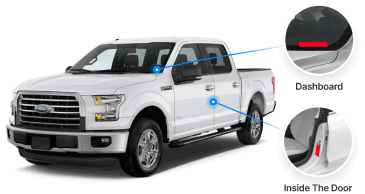A Vehicle Identification Number (VIN) is more than just a string of random characters. It's a unique code that holds the key to unlocking a wealth of information about a vehicle. This guide will help you understand how to read a Chevrolet VIN and what information you can gather from it. Every car's VIN is a detailed fingerprint that can tell you the car's country of origin, manufacturer, specifications, and model year. For those considering a used car purchase, decoding the VIN provides critical insights into the vehicle's past, such as accident history, maintenance records, and previous ownership. Understanding these details is essential for making an informed decision, ensuring that you know everything about the vehicle before you commit to buying.
Basic Facts about Chevrolet VIN Numbers
Every Chevrolet has a VIN, which is essential for various purposes, including registration, insurance, and service. Understanding how to read this vehicle identification number can help you verify the car's history and authenticity. For anyone looking to buy a used car, using a Chevrolet VIN decoder can provide invaluable insights into the vehicle's past, including its model year, manufacturing details, and previous ownership. This level of detail is crucial when comparing different vehicles or selecting a specific model. For example, accurate VIN information helps you understand the exact features and configuration of the car, ensuring that it meets your expectations and needs.
Who Needs to Use a Chevy VIN Decoder

Anyone from potential buyers to car enthusiasts might need to decode a Chevrolet VIN. This process is crucial for checking the car’s history, confirming its specifications, and ensuring it hasn’t been involved in any major incidents. By analyzing the vehicle's VIN, you can compare it with other motor vehicles, discerning critical aspects that may not be visible through a simple inspection. Each character represents specific information about the car, from its assembly line to its engine details. This VIN analysis is essential not just for contrasting one car against other vehicles, but also for confirming the unique attributes of the specific vehicle in question.
Where to Find Your Chevrolet VIN Code
You can find the Chevrolet VIN at several locations, commonly at the driver's side dashboard or the door jamb. It’s also on the vehicle registration, insurance card, and possibly the license plate. Additional spots include the driver's side door, where it's often affixed on a small metal plate and the lower corner of the windshield on the driver’s side. If you're still having trouble, inspect the area where the dashboard meets the windshield. Many cars display the VIN here to make it visible from outside the vehicle. Always check these common areas to ensure you locate your car’s VIN accurately.
In addition to the locations on the vehicle itself, the Chevrolet VIN can also be found on several important documents. The title document, for instance, always includes the VIN to legally identify the car. Service records and repair receipts often list the VIN as well, which can help track the vehicle's maintenance history. Even more, when you register your car or renew its registration, the VIN is recorded on those documents. Checking these papers provides a reliable method to verify the VIN, ensuring its accuracy and consistency across all associated records. This thorough documentation can be crucial for confirming the vehicle's identity in various legal and maintenance contexts.
How To Interpret a Chevy VIN
| Position in VIN | Description |
| 1st Digit | Country of Origin - Identifies the country where the vehicle was manufactured. |
| 2nd Digit | Manufacturer - Indicates that the manufacturer is General Motors (G for GM). |
| 3rd Digit | Division within Manufacturer - For Chevrolet, typically a specific code representing Chevrolet. |
| 4th Digit | Vehicle Type or Model - Sometimes this represents a specific vehicle type or model series. |
| 5th Digit | Body Style - Defines the type of body the vehicle has, such as sedan, coupe, hatchback, etc. |
| 6th Digit | Restraint System - Type of safety restraint system installed. |
| 7th Digit | Model Line and Series - Further details about the specific model line and series. |
| 8th Digit | Engine Type - Specifies the type of engine installed in the vehicle. |
| 9th Digit | Check Digit - A calculated value used to verify the VIN's validity (accuracy check). |
| 10th Digit | Model Year - Indicates the model year of the vehicle using a letter or number. |
| 11th Digit | Assembly Plant - Denotes the plant where the vehicle was assembled. Each plant has a unique identifier. |
| 12th Digit - 17th Digit | The unique serial number identifies the specific vehicle. |
World Manufacturer Identifier (WMI)
The first three characters of the VIN represent the WMI, which indicates the manufacturing country and the manufacturer itself. Specifically, the first digit reveals the country where the vehicle was manufactured. For instance, a Chevrolet VIN number starting with '1', '4', or '5' signifies that the car was assembled in the United States. The second character typically stands for the manufacturer, General Motors, indicated by 'G'. The third digit often provides information about the division within General Motors; for Chevrolet, it’s usually '1' or 'C'. This character means you’re looking at a vehicle from the Chevrolet division. Lastly, understanding these initial characters can help you verify the car vin directly tied to its assembly plant and origin.
Vehicle Descriptor Section (VDS)

The next characters, often from the fourth to the ninth, are known as the VDS. This section describes the vehicle type, engine type, and model. It includes details such as body type, indicating whether the car is a sedan, SUV, or other style. The transmission type and engine size are also specified here, providing essential vehicle information for buyers and mechanics. For instance, the characters can reveal whether the engine is a 4-cylinder or a V8 and whether the transmission is manual or automatic. Additionally, the check digit, located in the ninth position, helps validate the VIN’s authenticity. This section is crucial for identifying correct replacement parts and understanding the trim level of the vehicle, which influences the features and aesthetics.
Vehicle Identification Section (VIS)
The last part of the VIN, the VIS, includes information about the manufacturing plant and the car’s unique serial number. This section, often comprised of the last six characters of the VIN, focuses on the vehicle's production numbers, which are crucial for identifying specific units in a series. Each serial number is unique to an individual vehicle, allowing for accurate tracking and recall actions if necessary. When you decode these numbers, you gain access to specific data about when and where the vehicle was assembled. This detail is particularly valuable when purchasing a used car, as it helps verify the vehicle's history and authenticity. The vehicle identifier section is essential for those needing detailed information about a vehicle's manufacturing background.
What Can You Get from a Chevrolet Vehicle History Report?

By decoding a Chevy VIN, you can access a detailed report that includes past ownership, any accidents, service history, and more. This is invaluable for anyone considering purchasing a used Chevrolet. A VIN decoder facilitates a comprehensive VIN check, allowing you to obtain a more detailed report with specifics such as safety recalls and maintenance records. Such information is critical, as it can significantly impact your decision. Moreover, many services offer a free VIN check, providing an initial overview that can alert you to potential issues. Every vehicle identification number offers a unique glimpse into the life of cars, revealing vital information that might not be immediately apparent from a physical inspection or seller's disclosures.
Summary
Understanding a Chevrolet VIN is crucial for any owner or buyer. This unique code can provide essential information about the vehicle’s history, ensuring transparency and security in vehicle transactions. By learning how to find the VIN and decode it, drivers can access detailed data on vehicles, including their model, past damages, and even previous insurance claims. This process demystifies the vehicle identification numbers, making it easier for potential car buyers to make informed decisions. Decoding the VIN helps verify the vehicle’s authenticity and can prevent fraudulent sales, ensuring that all disclosed information aligns with the actual specifications and history of the cars.
Frequently Asked Questions
Yes, the VIN provides detailed specifications about your Chevrolet, including the model year, engine type, and more. Additionally, the VIN can reveal important safety features and trim levels, giving you a complete overview of what the vehicle offers. This information is especially useful when comparing different cars or verifying the features advertised by a seller.
The engine code in a Chevrolet VIN is found within the Vehicle Descriptor Section (VDS) and provides information about the engine type and configuration. This specific code, often a single letter or number, indicates whether the engine is a V6, V8, or another type, as well as its displacement and fuel system type. By understanding this code, you can accurately determine the engine's capabilities.
The model year is coded within the VIN. It's usually represented by one letter or number in the 10th position from the left. This character follows a standardized system where each letter or number corresponds to a specific year, rotating through a sequence established by the automotive industry. For instance, a VIN with a 10th character of 'L' typically indicates a model year of 1990 or 2020.








